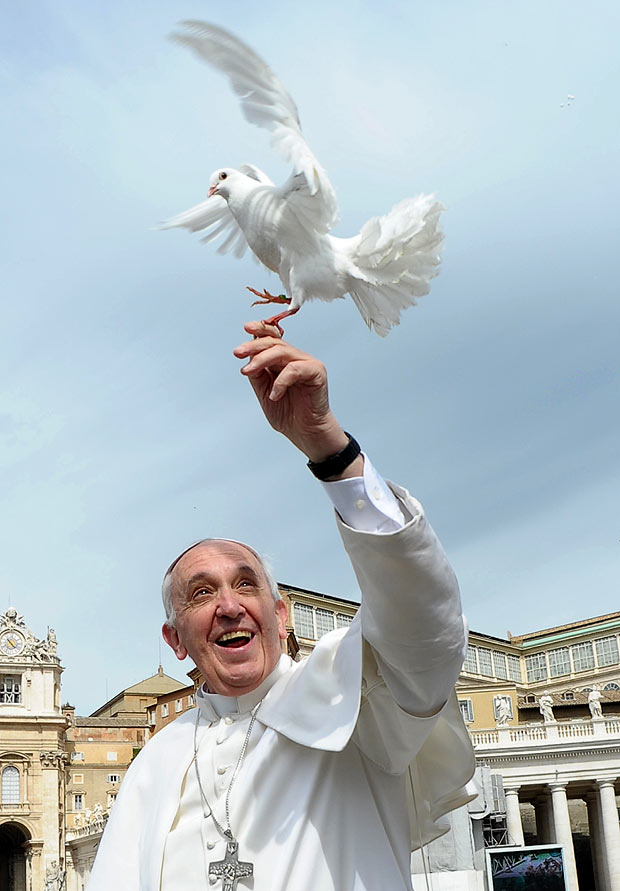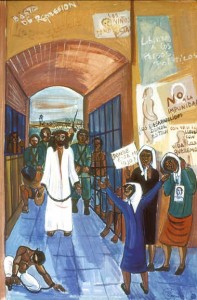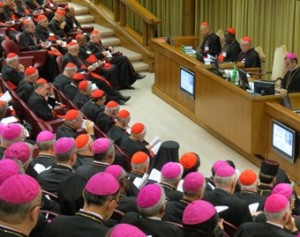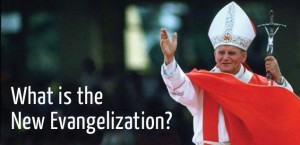I think there is a common misconception in the Archdiocese of Detroit that there is a priest shortage! When I compare the number of priests to the number of parishes in the Archdiocese, it seems clear to me that there is not a priest shortage. If I am right, sociologists would call “the priest shortage” a mythic fact, myth in the sense of statistically not true. Let me explain. Continue reading
Category Archives: First Tags
The Social Dimension of the New Evangelization
 I would like to thank Sarah Moran for her insightful blogs (3 of them) on “The Social Dimensions of Evangelization,” even though I am late in responding. Stressing the social dimensions of Pope Francis’ thought in his Apostolic Exhortation Evangelii Gaudium is important and timely. In stressing a social dimension Pope Francis is not diverging from the thought of Popes John Paul II and Benedict XVI, but, he is “emphasizing” something different than they. And it is not just an emphasis on the poor that makes Francis different; it is his systematic treatment of the “social” dimension, particularly as it relates to the poor. Paragraph 57 of his exhortation is shockingly “social” in my estimation in arguing that what you and I have (money) is already the poor’s, it is not like we are giving them something of ours: “Not to share one’s wealth with the poor is to steal from them and to take away their livelihood. It is not our own goods which we hold, but theirs.” Continue reading
I would like to thank Sarah Moran for her insightful blogs (3 of them) on “The Social Dimensions of Evangelization,” even though I am late in responding. Stressing the social dimensions of Pope Francis’ thought in his Apostolic Exhortation Evangelii Gaudium is important and timely. In stressing a social dimension Pope Francis is not diverging from the thought of Popes John Paul II and Benedict XVI, but, he is “emphasizing” something different than they. And it is not just an emphasis on the poor that makes Francis different; it is his systematic treatment of the “social” dimension, particularly as it relates to the poor. Paragraph 57 of his exhortation is shockingly “social” in my estimation in arguing that what you and I have (money) is already the poor’s, it is not like we are giving them something of ours: “Not to share one’s wealth with the poor is to steal from them and to take away their livelihood. It is not our own goods which we hold, but theirs.” Continue reading
Micro-Mobilization and The South Bend March for Life: Some Preliminary Thoughts
 While most of us were thinking about the March for Life in Washington DC, or perhaps of the upcoming Marches in the UK and Paris, the St. Joseph’s Right to Life society organized a March for Life right here in South Bend. The South Bend demonstration was conducted from 12pm-1pm on Wednesday, January 22nd in front of the Courthouse at 204 S. Main Street in Downtown South Bend. During the hour long march, I conducted twelve approximately five minute interviews with march participants. Continue reading
While most of us were thinking about the March for Life in Washington DC, or perhaps of the upcoming Marches in the UK and Paris, the St. Joseph’s Right to Life society organized a March for Life right here in South Bend. The South Bend demonstration was conducted from 12pm-1pm on Wednesday, January 22nd in front of the Courthouse at 204 S. Main Street in Downtown South Bend. During the hour long march, I conducted twelve approximately five minute interviews with march participants. Continue reading
Thesis Seven: Practices
The article above should be discussed by sociologists, especially sociologists of religion, and so I highlight one of the 23 theses with that discussion in mind.
Thesis seven states: “disciplinary preoccupations and trends often include conceptual inadequacies and biases that impede the serious study of religion.” Continue reading
Happy New Year to Linda Kawentel and Mike McCallion: Co-Winners of the 2013 “Convo” Award
As was the case last year, the blog has been silent over the break, but with the new semester gearing up, we will begin posting again soon. Again, similar to last year, I thought that we would start with a brief review of The Catholic Conversation in 2013. A big thank you to all of our contributors this past year: Sarah Moran, Mike McCallion, Linda Kawentel, Mike Cieslak, Michael Altenburger, Laura Taylor, Gary Adler, and Carol Ann MacGregor. I also appreciated the guest remembrances of Fr. Andrew Greeley’s life and legacy by Larry Cunningham, Melissa Wilde, and Mike Hout. And thank you to all of our readers this past year as well!
By the Numbers:
In 2013, we had 42 posts, 8,707 visitors, and 14,990 page views. The average time viewers spent on a page was 2 minutes 28 seconds.
I am pleased to announce that the second annual “Convo” award for the most popular contribution to the Catholic Conversation is being shared by two worthy contributors this year–Mike McCallion and Linda Kawental. The single most-viewed post was Linda Kawental’s “NFP and Divorce Rates: More Research Needed” This post received 1,963 pageviews in 2013 and the average viewer spent 4 minutes and 41 seconds viewing it. It’s largest single day viewing was on July 24th, which just happened to be during NFP awareness week. However, Linda actually wrote this post in 2012. Plus, since Linda won the “Convo” outright last year (and as I’m not restricted by any official rules for this decidedly unofficial award), I decided it was fitting to also award Mike McCallion a “Convo” for his post entitled “Lex Orandi, Lex Credendi” This insightful post linking the work of Durkheim with that of Mark Massa illustrates the importance of liturgy and practice for understanding religion sociologically and received 705 pageviews in 2013.
Congratulations Linda and Mike!
Who will win the prestigious “Convo” in 2014? We shall find out over the next three hundred and some days. By the way, let us know how we’ve done and what you’d like to see more of in 2014.
—
photo by Michael Holden via Flickr
The Social Dimension of Evangelization (Part 3-Conclusion)
Previous posts in this series can be found here (part 1) and here (part 2).
Pope Francis and Evangelii Gaudium
If the “new evangelization” has become the definitive terminology and vision of the Catholic Church’s mission today, how is the papacy of Pope Francis shaping this ongoing conversation about the relationship between evangelization and works of charity and social justice? Evangelii Gaudium offers a clue. The fourth chapter is given over to a reflection on the social dimension of evangelization. Interestingly, Pope Francis quickly connects the terms “evangelization” and “liberation” in this discussion:

“Evangelization is meant to cooperate with this liberating work of the Spirit. The very mystery of the Trinity reminds us that we have been created in the image of that divine communion, and so we cannot achieve fulfilment or salvation purely by our own efforts. From the heart of the Gospel we see the profound connection between evangelization and human advancement, which must necessarily find expression and develop in every work of evangelization” (178; emphasis mine).
The relationship between evangelization and charity is a theme dear to Pope Francis. Pope Francis suggests a fundamental link between the preaching of the Gospel and the promotion of human life in all of its expressions: “The kerygma has a clear social content: at the very heart of the Gospel is life in community and engagement with others. The content of the first proclamation has an immediate moral implication centred on charity.” (177).
Moreover, he points to work for social justice as a key test of a “faith which is authentic,” since genuine faith “always implies a profound desire to change the world” (183). Interestingly, on this point he again does not steer away from connecting evangelization and liberation as concepts: “Each individual Christian and every community is called to be an instrument of God for the liberation and promotion of the poor, and for enabling them to be fully a part of society” (187). Continue reading
The Social Dimension of Evangelization (Part 2)
Latin America and the New Evangelization
In my previous post, I considered the historical precedent in magisterial and some bishops’ writings on the New Evangelization (NE) to underscore the necessary social dimensions of sharing the Good News, that is, of evangelization. But I also highlighted a certain ambivalence about the terms and ideas of “liberation” and “social justice” in their comments about the precise relationship between evangelization and work for societal change.
It is illuminating to explore the position of Latin American bishops and liberation theologians on the topic of the NE, since a stress on the intimate connection between the Christian faith and work for social justice and “preferential option for the poor” has become a hallmark of Latin American theology and pastoral practice. What is the contribution of Latin American bishops to the conversation about the socioeconomic aspects of evangelization? Responding to John Paul II’s call for the NE in 1992, the Latin American bishops embraced the mission of the NE and, with John Paul II, suggest that “human development” concerns can be understood as a dimension of the wider task of the NE. Yet importantly, they note the violations of human dignity associated with Christian evangelization in the Americas, for example: “With John Paul II,” they write, “we want to ask God’s pardon for this ‘unknown holocaust’ in which ‘baptized people who did not live their faith were involved.’”[1] The bishops elaborate on evangelization’s social justice dimensions and urge that the “new evangelization” not become exploitive, but rather champion the poor’s socioeconomic liberation.[2] For them, this is key if evangelization today is to be “new in its ardor, in its methods, and in its expression,” as John Paul had remarked.[3] Continue reading
The Social Dimension of Evangelization (Part 1)
Few Catholic commentators would deny that the New Evangelization has become one of the–if not the–most important ecclesial policies of the Catholic Church today. Influential Catholic reporter John Allen suggests that the term itself has “become the buzzword par excellence in Catholic circles. Books are being published, lectures given, conferences organized, diocesan offices created, and whole courses of study put together, all devoted to the ways and means of the New Evangelization.”[1] Many have also noted Pope Francis’ deep concern for the poor and the social implications of the Gospel and questioned how his papacy will shape the meaning of and conversation about the New Evangelization (NE).
This is the question I’d like to explore in a series of posts.Building upon the important sociological research of two of our contributors, Mike McCallion and Benjamin Bennett-Carpenter, on this topic, I’d like to ask the following: What is the place of Catholic social teaching and liberation theology in the ongoing conversation about and vision of the NE in the U.S. and beyond? Pope Francis’s brand new apostolic exhortation, Evangelii Gaudium, will be a suitable place to end this discussion. But first… Continue reading
7 Insights for the NE from a Social Ritual Practices Perspective
If we reflect on the NE from a social ritual practices perspective, then I think professionals would start perceiving the 30% of Catholics who attend Mass more positively (not from a deficit model).
- I think the recent book by Michael White and Tom Corcoran (White, Michael and Corcoran, Tom. 2013. The Story of a Catholic Parish Rebuilt: Awakening the Faithful Reaching the Lost Making Church Matter. Notre Dame: Ave Maria Press) is a good example of professionals believing pew-dwellers are not good enough and operating out of a deficit model of Catholicism (especially in the first 80 or 90 pages).
If we reflect on the NE from a social ritual practices perspective, then I think professionals would start realizing EDUCATION is not the only answer to the issues facing the Church.
If we reflect on the NE from a social ritual practices perspective, then I think professionals would have an even deeper appreciation of the sacraments and our Catholic sacramentalizing processes.
If we reflect on the NE from a social ritual practices perspective, then I think professionals would promote every parish having LARGE KITCHENS in order for families to gather at the parish for not only coffee and donuts but spaghetti dinners, fish fries, etc. etc.
If I reflect on the NE from a social ritual practices perspective, then I think professionals would promote PARISH Christian Service Coordinators and Youth Ministers ministering together more so than they do now. If I am going to get the teens in Redford Township to come back to church I need to say, “hey, Joe and Pete, I need you guys to help me build this home for this poor widow (or whatever the service project is) and then after the project I would catechize them about how we were doing the work of the Lord. Understand, however, that it has to be some kind of lengthy or ongoing Christian service project, not simply setting up chairs or collecting clothes. Consequently, every parish needs to have a CHRISTIAN SERVICE COORDINATOR and a YOUTH MINISTER and they must work closely together – from a social ritual practices perspective.
If I reflect on the NE from a social ritual practices perspective, then I would realize more fully how CATHOLIC my mother and father (and even some of my aunts and uncles) really were.
If we reflect on the NE from a social ritual practices perspective, not to denigrate or suggest we should not engage in educational activities concerning the NE (workshops, conferences, adult education sessions, etc.), then I think we would start thinking about DOINGS, ACTIVITIES, CHRISTIAN SERVICE PROJECTS that we could get former Catholics and youth involved in rather than predominantly inviting them to scripture studies or adult education sessions or NE workshops. I have suggested, for example, to the Archbishop that the Archdiocese should have a World Youth Day at the diocesan level. It would include catechesis, but catechesis would be the least powerful evangelization tool. The processing together to some common area in the diocese would be the most powerful evangelization tool from a social ritual practices perspective.
How Does This Sociologist Think About the NE?
I believe the NE (New Evangelization) and “handing on the faith” today is not purely or even mostly a cognitive task or challenge. It is not solely about our passing on formulaic content. I think THE TASK IS A PROFOUNDLY SOCIOLOGICAL ONE. Sociology has experienced a disciplinary turn away from examining predominantly cognitive, belief, and rational factors (as important as these are) TO examining emotional, bodily, ritual factors (or mind to body; language to behaviors; rational to nonrational, ideas to practices; texts to performances; myths to rituals or in more liturgical terms lex orandi, lex credendi and the Catholic understanding of mystagogical catechesis).





